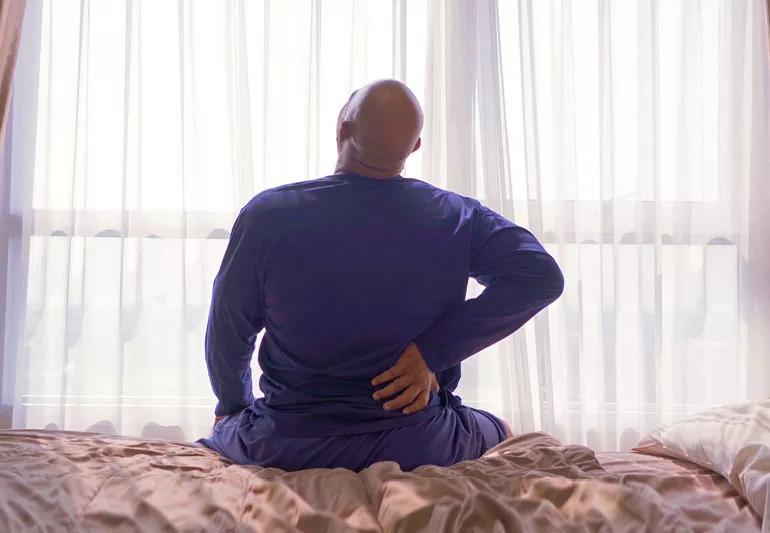Find the right sleep position to tame your joint pain

Image content: This image is available to view online.
View image online (https://assets.clevelandclinic.org/transform/7f32e641-92de-4b68-97b7-aa5e90629eff/sleepPain-1297037675-770x533-1_jpg)
man in pain after sleeping
If you roll out of bed bleary-eyed every morning, thinking, “Oh, my aching [insert painful joint here],” you’re not alone.
Advertisement
Cleveland Clinic is a non-profit academic medical center. Advertising on our site helps support our mission. We do not endorse non-Cleveland Clinic products or services. Policy
Research shows that between 50% and 90% of people who have chronic joint pain don’t sleep well. And, that sleep deprivation can lead to other health issues, including low energy, mood disorders and eating problems.
If you have chronic pain in your hips, knees or shoulders, there are things you can do to limit how much the discomfort affects your nighttime rest.
“A healthy brain is a well-rested brain. It can deal better with pain, such as arthritis, on an ongoing basis,” physiatrist Geraldine Dapul, MD, says. “Lack of sleep, on the other hand, can directly affect your mood, and a bad mood can make it harder to cope with pain. This can become a vicious cycle.”
Some problems with broken sleep patterns are normal as we age, according to Dr. Dapul. But you should not wake up and stay awake every night because of pain. If this sounds similar to your situation, consult your primary care physician.
“If your pain goes on for more than three or four days in a row or intermittently for two to three weeks, it’s time to get it addressed,” Dr. Dapul says. “And if your pain is so severe that you require alcohol or over-the-counter sleep aids to fall asleep, then it’s worth getting it looked at.”
Advertisement
See your doctor if you have joint pain and:
Any of these problems can indicate a more serious condition in need of immediate medical attention.
Video content: This video is available to watch online.
View video online (https://cdnapisec.kaltura.com/p/2207941/sp/220794100/playManifest/entryId/1_6xt7du16/flavorId/1_5f3sgelj/format/url/protocol/https/a.mp4)
YouTube video player
Finding the right position can be the most crucial part of avoiding pain during sleep. Twisting and turning to find a comfortable spot is normal, Dr. Dapul says. But even the slightest twinge of pain can disrupt your rest. She recommends starting out sleeping on your side — avoid a sore shoulder if you have one — with a pillow between your legs. Try avoiding lying flat on your back, too.
Side-sleeping won’t work for all shoulder pain, though. Minimize that discomfort by wrapping your arm in a bandage or wearing a sling to bed. It’ll keep your arm immobile and prevent you from sleeping with your arm in an awkward position.
Dr. Dapul also offers some general sleep recommendations to help nearly anyone, not only pain sufferers.
Normal joint pain, especially in your hips, knees and shoulders, frequently worsens at night, notes Dr. Dapul. Your sleep position and the alignment of your body are responsible for most of the pain, but some comes from being so still at night. Being in a flexed, fixed position throughout the night may also contribute to pain.
“Joints swell at night, and motion gradually lubricates them and keeps the fluids moving round,” she says. “When you stop moving, they can swell more. This can cause stiffness and pain.”
Advertisement

Sign up for our Health Essentials emails for expert guidance on nutrition, fitness, sleep, skin care and more.
Learn more about our editorial process.
Advertisement
Acute pain goes away with treatment, while chronic pain is long-lasting and can be complex to manage
Not all signals of physical pain actually make it to our brains — and you have some power over it
Good pain or bad? Know the different kinds and when to seek help
Therapy helps pain sufferers get their sleep
Tips to help your pain management specialist help you
In a major study, 93% of people saw a reprieve in pain
They put the kibosh on overzealous nerves
Sleep masks can help you create total darkness so you can sleep better
Although it could be used as a moisturizer, this new trend is not recommended
Communicating clear limits helps protect your time, energy and emotional well-being
High cholesterol can be genetic, but testing and treatment can lower your heart disease risk